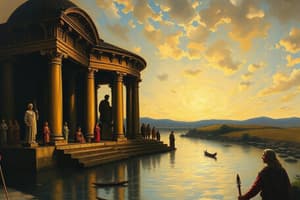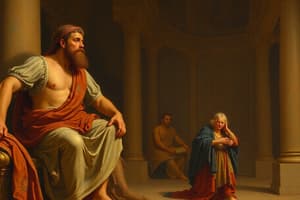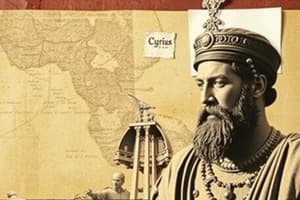Podcast
Questions and Answers
Who united the Persians into a powerful kingdom?
Who united the Persians into a powerful kingdom?
Cyrus the Great
The Royal Road stretched from Asia Minor to Susa, the Persian capital.
The Royal Road stretched from Asia Minor to Susa, the Persian capital.
True (A)
What was the title of the officials who ruled the 20 provinces that Darius divided the empire into?
What was the title of the officials who ruled the 20 provinces that Darius divided the empire into?
- Judge
- Protector
- King
- Satrap (correct)
What was the Persian religion called?
What was the Persian religion called?
In what battle did a persian fleet land 20,000 soldiers?
In what battle did a persian fleet land 20,000 soldiers?
What was the name of the messenger who ran from Marathon to Athens after the battle?
What was the name of the messenger who ran from Marathon to Athens after the battle?
Who became the Persian king, after Darius died in 486 B.C.?
Who became the Persian king, after Darius died in 486 B.C.?
What was the best place for the Greeks to block the Persians and stall them to ready their fleet for battle?
What was the best place for the Greeks to block the Persians and stall them to ready their fleet for battle?
In what strait did the Greek fleet attack the Persian fleet?
In what strait did the Greek fleet attack the Persian fleet?
The Greek army crushed the Persian army at what battle, northwest of Athens?
The Greek army crushed the Persian army at what battle, northwest of Athens?
Why was Cyrus considered a fair ruler?
Why was Cyrus considered a fair ruler?
What was the Royal Road?
What was the Royal Road?
Flashcards
The Persian Empire
The Persian Empire
The empire that united a large area under a single government in the east.
Cyrus the Great
Cyrus the Great
The king who united the Persians into a powerful kingdom and allowed captive Jews to return home.
Satrapies
Satrapies
Provinces into which Darius divided the Persian Empire.
Satrap
Satrap
Signup and view all the flashcards
Zoroastrianism
Zoroastrianism
Signup and view all the flashcards
Darius
Darius
Signup and view all the flashcards
Royal Road
Royal Road
Signup and view all the flashcards
Immortals
Immortals
Signup and view all the flashcards
Persian Wars
Persian Wars
Signup and view all the flashcards
Marathon
Marathon
Signup and view all the flashcards
Xerxes
Xerxes
Signup and view all the flashcards
Thermopylae
Thermopylae
Signup and view all the flashcards
Themistocles
Themistocles
Signup and view all the flashcards
Strait of Salamis
Strait of Salamis
Signup and view all the flashcards
Plataea
Plataea
Signup and view all the flashcards
Herodotus
Herodotus
Signup and view all the flashcards
Cyrus Fair Rule
Cyrus Fair Rule
Signup and view all the flashcards
Darius' Satrapies?
Darius' Satrapies?
Signup and view all the flashcards
Royal Road Purpose
Royal Road Purpose
Signup and view all the flashcards
Athens and Sparta
Athens and Sparta
Signup and view all the flashcards
Xerxes Revenge?
Xerxes Revenge?
Signup and view all the flashcards
Difficult attacks
Difficult attacks
Signup and view all the flashcards
High Taxes?
High Taxes?
Signup and view all the flashcards
Persian Empire Fall?
Persian Empire Fall?
Signup and view all the flashcards
Immortals?
Immortals?
Signup and view all the flashcards
Stall the Persians?
Stall the Persians?
Signup and view all the flashcards
Leonidas?
Leonidas?
Signup and view all the flashcards
Reasons?
Reasons?
Signup and view all the flashcards
Turning Point?
Turning Point?
Signup and view all the flashcards
Marathon?
Marathon?
Signup and view all the flashcards
Study Notes
Persia Attacks the Greeks
- In Section 2, it was explained that the Greeks built strong but separate city-states.
- Simultaneously, the Persians were constructing a powerful empire to the east.
- It was only a matter of time before Persia attempted to invade Greece.
- The Persian Empire united a wide area under a single government.
- Both Sparta and Athens played roles in defeating the Persians.
- The people of Persia lived in what is today southwestern Iran.
- Early Persians were warriors and nomads who herded cattle.
- For a period of time, they were dominated by others until Cyrus the Great united the Persians into a powerful kingdom.
- Under Cyrus's reign (559-530 B.C.), Persia began building an empire larger than any seen before.
- In 539 B.C.,Cyrus's armies swept into Mesopotamia and captured Babylon.
- They then took over northern Mesopotamia, Asia Minor, Syria, Canaan, and the Phoenician cities. Cyrus treated all his new subjects well, allowing the captive Jews in Babylon to return home.
- Cyrus's merciful rule helped hold his growing empire together.
- Leaders following Cyrus expanded Persian territory, conquering Egypt, western India, and Thrace.
- The Persian Empire was about the size of the continental United States.
- The Persians built miles of roads to connect their vast holdings
- The Royal Road stretched from Asia Minor to Susa (the Persian capital).
- Along the Royal Road, the Persians set up roadside stations to supply food, shelter, and fresh horses to the king's messengers.
- As the Persian Empire grew, it became difficult to manage.
- Darius reorganized the government to make it work better when he came to the throne in 521 B.C.
- Darius divided the empire into 20 provinces called satrapies.
- Each satrapy had its own ruler, called a satrap, meaning "protector of the kingdom"
- The Satrap acted as tax collector, judge, chief of police, and head recruiter for the Persian army.
- All the satraps answered to the Persian king.
- The king's power depended upon his troops, Persia had a large army of professional soldiers.
- The government paid people to be full-time soldiers.
- Among the soldiers, 10,000 specially trained soldiers guarded the king and were called the Immortals.
- The Persian religion was called Zoroastrianism which was founded by Zoroaster. Zoroaster born in 660 B.C., preached after seeing visions as a young man.
- Zoroaster believed in one god viewed this supreme being as the creator of all things and a force of goodness.
- Zoroaster recognized evil in the world.
- Humans had the freedom to choose between right and wrong, and that goodness would triumph in the end.
- The Persians practiced Zoroastrianism for centuries.
- Both Sparta and Athens played roles in defeating the Persians.
- As Greeks set up colonies in the Mediterranean, they often clashed with the Persians.
- By the mid-500s B.C., Persia already controlled the Greek cities in Asia Minor.
- In 499 B.C., Athenian army helped the Greeks in Asia Minor rebel against their Persian rulers.
- The rebellion failed, but King Darius decided the mainland Greeks had to be stopped from interfering in the Persian Empire.
- In 490 B.C., a Persian fleet landed 20,000 soldiers on the plain of Marathon, a short distance from Athens for the Battle of Marathon.
- For several days, the Persians waited there for the Athenians to advance.
- The Athenians had only 10,000 soldiers compared to the Persians' 20,000.
- The Athenians held back in the hills overlooking the plain and didn't engage in battle.
- The Persian commander decided to sail south and attack Athens directly
- His first move was to board the horsemen (cavalry) which was the strongest part of the Persian army
- The Greeks charged down from the hills and onto the plain of Marathon.
- They caught the Persian foot soldiers standing in the water, waiting their turn to board the ships.
- Since they were unable to defend themselves, the Persians were easily defeated.
- Pheidippides raced nearly 25 miles (40.2 km) from Marathon to Athens where he died a he announced "Victory"
- Marathon races are named for this famous run and are just over 26 miles long.
- After Darius died in 486 B.C., his son Xerxes became the Persian king.
- In 480 B.C., Xerxes launched a new invasion of Greece, this time with about 180,000 troops and thousands of warships and supply vessels.
- The Greeks joined forces to defend themselves with Sparta and their king, Leonidas, leading the soldiers, and Athens providing the navy.
- Themistocles came up with a plan to fight the Persians.
- The Greeks knew that the huge Persian army marched south, it depended on shipments of food brought in by boat.
- Themistocles argued to attack the Persian ships and cut off food supplies to the army
- The Greeks needed to stall the Persian army before it reached Athens.
- The Greeks decided to block the Persians at Thermopylae which was a narrow pass through the mountains that was easy to defend
- 7,000 Greek soldiers held off the Persians there for two days.
- The Spartans in the Greek army were especially brave
- Because a traitor directed the Persians to a mountain path that led them around the Greeks the Greeks lost the battle at Thermopylae.
- King Leonidas had sent most of his troops to safety, he and several hundred others, however, stayed behind and fought to the death.
- Their valiant stand gave Athens enough time to assemble 200 ships.
- The Greek fleet attacked the Persian fleet in the strait of Salamis with the Greek expected to have the upper hand due to the battle happening in tight spaces
- Greek ships were smaller, faster, and easier to steer than the big Persian ships, which became easy targets.
- The Greek plan worked and the Greeks destroyed almost the entire Persian fleet.
- The Persian army marched on and burned the city although the Greeks had already fled
- The Greeks formed the largest Greek army ever assembled with solid body armor, longer spears, and better training
- The Greek army crushed the Persian army at Plataea, northwest of Athens, convincing the Persians to retreat to Asia Minor.
- By working together, the Greek city-states had saved their homeland from invasion.
- When the Greeks defeated the Persian army, they helped to weaken the Persian empire which was already facing internal problems.
- Persia remained intact for almost 150 more years although other Persian rulers who came after Darius and Xerxes, raised taxes to gain more wealth.
- They spent the gold and silver that flowed into the treasuries on luxuries for the royal court
- The high taxes angered their subjects and caused many rebellions and the Persian royal family fought over who was to be king
- Many of the later Persian kings were killed by other family members who wanted the throne
- Persian kings had many wives and children and the sons would plot to take over the throne so six of the nine rulers, after Darius, were murdered
- By the time Alexander invaded the empire in 334 B.C., the Persians were no match for his troops.
- By 330 B.C., Alexander ruled over all his lands as the last Persian king was dead.
Studying That Suits You
Use AI to generate personalized quizzes and flashcards to suit your learning preferences.




